|
LE FIGARO LITTERAIRE-N°1153-DU 20 AU 26 MAI 1968
50 PAGES-LE BLOC NOTES DE FRANCOIS MAURIAC, 2P-EVENEMENTS DE MAI 1968; TEXTE DE ROGER IKOR SUR LA JEUNESSE, 2P-LES SECRETS DIPLOMATIQUES DE LA GUERRE D'ISRAEL, 3P-L'HOMME EN EST BIOLOGIQUEMENT RESTE A CRO MAGNON, 2P-PRESENTATION DU ROMAN "LE PAVILLON DES CANCEREUX" D'ALEXANDRE SOLJENITSYNE, 3P-CRITIQUE PAR ROBERT KANTERS DES ESSAIS DE MICHEL BUTOR "LA MODIFICATION" ET "6.800.000 LITRES D'EAU PAR SECONDE", 1P1/2-CRITIQUE PAR LUC ESTANG DU LIVRE "UNE FEMME PRISONNIERE" DE JEAN JACQUES GAUTIER, 1/2P-CRITIQUE PAR MAURICE CHAPELAN DU LIVRE "JOURS DE KABYLIE" DE MOULOUD FERAOUN, 1/2P-ENTRETIEN DE JACQUES PAOLI, 1/2P-ANDRE BILLY RACONTE LECONTE DE LISLE, OCTAVE AUBRY ET RENE BOYLESVE, 1P-ENTRETIEN DE MARGUERITE YOURCENAR PAR JEAN CHALON, 1P-CRITIQUES PAR ROBERT SABATIER DES LIVRES "L'OBSESSION DE DELPHES" DE JEAN SULLIVAN, "LA MORT DE PERSONNE" DE DOMINIQUE ABADIE ET "LES VENDANGES" D'ANNE HURE, 1/2P-TEXTE DE GEORGES MATHE SUR LA VOCATION DE LA SECURITE SOCIALE, 2P-REPORTAGE DE PIERRE FISSON SUR LA NOUVELLE ZELANDE, 2P-CRITIQUE PAR JACQUES LEMARCHAND DE LA PIECE "LES ROSENBERG NE DOIVENT PAS MOURIR" D'ALAIN DECAUX JOUEE AUX TRETEAUX DE FRANCE, AVEC SILVIA MONFORT ET BERNARD ROUSSELET (PHOTOS), 1P-CRITIQUE PAR CLAUDE MAURIAC DU FILM "LES GAULOISES BLEUES" DE MICHEL COURNOT PRESENTE AU FESTIVAL DE CANNES, 1P-TEXTE DE PIERRE MAZARS SUR JAN LEBENSTEIN AVEC REPRODUCTION DE SON TABLEAU "AUX PETITS SOINS", 1/2P-LA ROBE QUI VAUT UN MILLIARD, MODELE DE PACO RABANE PORTE PAR FRANCOISE HARDY POUR L'INAUGURATION DE L'EXPOSITION, 1/4P-LA PHILATELIE AVEC CLAUDE DARGET: LES GRANDS HOMMES, 1/2P-DECOUPAGE EN TOUTE DERNIERE PAGE D'UN COUPON A RETOURNER (VOIR PHOTO)
Referencia librero : ABE-1696606543033

|
|
|
LE FIGARO LITTERAIRE-N°618-22 FEVRIER 1958
14 PAGES-EN UNE: "ROUAULT CHEZ LUI, FACE A SON OEUVRE" PAR MARCEL ARLAND/PHOTO/SUITE P13/LES CLOWNS-LE JEU DE MASSACRE DE ROUAULT/PAR CLAUDE ROGER-MARX-ROLAND PETIT JOUE ET GAGNE/PAR FRANCOIS GUILLOT DE RODE/5 PHOTOS-CRUEL, EGOISTE, PLAGIAIRE: AINSI LE VOIT UN BIOGRAPHE AMERICAIN DEFENDRE DEBUSSY? C'EST FACILE! ET PREUVES A L'APPUI./PAR PASTEUR VALLERY-RADOT/PHOTO
Referencia librero : ABE-7979830506
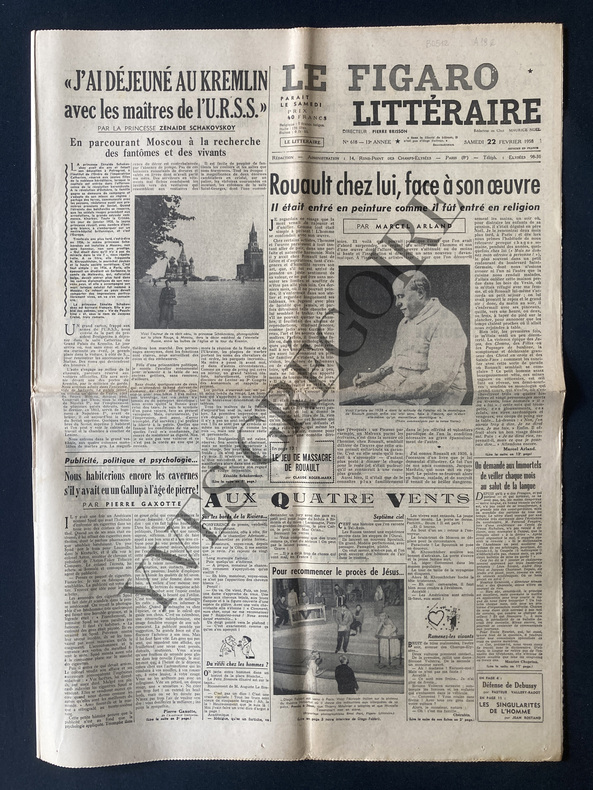
|
|
|
LE FIGARO LITTERAIRE-N°580-1 JUIN 1957
14 PAGES FORMAT 40X60-VISITE A LAURENCE OLIVIER/UN PORTRAIT INTERVIEW DE PAUL GUTH/PHOTO/SUITE P7/2 PHOTOS-LOUIS MARTIN CHAUFFIER RECOIT LE GRAND PRIX NATIONAL DES LETTRES/PHOTO-NOUS, NAPOLEON.COMMENT LES PLUS FAMEUX INTERPRETES DE L'EMPEREUR COHABITENT AVEC LEUR PERSONNAGE/PAR GEORGES RAVON/DIEUDONNE/EMILE DRAIN-LE PRIX HELENE VACARESCO A CLAUDE ROGER MARX/PHOTO-LE TOME III DE LA "CORRESPONDANCE" DE DIDERO/PAR ANDRE BILLY-LA COUR DES COMPTES A CENT CINQUANTE ANS/1P PAR LOUIS HASTIER/2 PHOTOS-ANDRE CHAMSON SOUS LA COUPOLE/PHOTO-SIMENON A DE QUOI LOGER SES PERSONNAGES/PHOTO MAISON CANTON DE VAUD-A LA RECHERCHE DU MERVEILLEUX/PAR CLAUDE ROGER MARX ANDRE MASSON ET ROBERT DELAUNAY/2 ILL-THEATRE: "L'ECOLE DES FEMMES" MISE EN SCENE DE LOUIS JOUVET A L'ATHENEE/PAR JACQUES LEMARCHAND/PHOTO ANNA TONIETTI ET ETCHEVERRY-"PROTEE" DE PAUL CLAUDEL AU THEATRE DU TERTRE/PHOTO-MANQUE EN MARGE DROITE DE UNE
Referencia librero : ABE-9022163589

|
|
|
LES NOUVELLES LITTERAIRES-N°2025-23 JUIN 1966
14 PAGES-EN UNE: "LA FIN DES MANDARINS OU VA L'ENSEIGNEMENT DE LA PHILOSOPHIE?/SUITE EN P10/SARTRE/PLATON/NIETZSCHE/MARX-ADIEU A BEN/DESSIN-"UN GRAND SAVANT NOUS A QUITTES" PAUL WINTREBERT/PAR JACQUES MOREAU/PHOTO-LES ROSES ROUGES DE JUIN/PAR GERMAINE BEAUMONT-L'ANGLETERRE AUX CHEVEUX LONGS/1P/PHOTO-"HOKUSAI ET LES AUTRES" PAR JEAN A.KEIM/1P/4 ILLUSTRATIONS-"VICTOR HUGO PAR LA CARICATURE" A LA MAISON DU POETE/LA CIBLE ETAIT TROP BELLE!/3 DESSINS-
Referencia librero : ABE-7903288530
|
|
|
LES NOUVELLES LITTERAIRES-N°2080-13 JUILLET 1967
12 PAGES FORMAT 42X60-1867 1967 UN CAPITAL: LE CAPITAL/PAR ANDRE ROBINET/SUITE P6-EN UNE: PHOTO 21X15,5 DE LA MAQUETTE DE M.FAUGERON POUR LES HALLES DE RUNGIS-LE SECRET D'ALBERTINE SARRAZIN PAR JEAN FRANCOIS JOSSELIN-IL Y A 25 ANS: LA RAFLE DU VEL'D'HIV' LE GRAND MASSACRE DE PARIS/1P PAR JACQUES ROBICHON/PHOTO-LA PHILOSOPHIE PAR ANDRE ROBINET MARX, NOTRE CONTEMPORAIN-Y A T IL UN OU PLUSIEURS MARX? MARXISME ET STRUCTURALISME PAR FRANCOIS CHATELET-UNE BRULANTE ACTUALITE LA DECADE DE CERISY PAR MAURICE DE GANDILLAC-LUKACS LE SCANDALEUX PAR HENRI ARVON-COMMENT COMBLER LE VIDE PHILOSOPHIQUE MARXISME ET PHENOMENOLOGIE, PAR RENE SCHERER-LA PURIFICATION SALUTAIRE MARXISME ET THEOLOGIE PAR JEAN PEPIN-L4OPIUM DU PEUPLE EN QUESTION MARXISME ET PROTESTANTISME PAR PIERRE BURGELIN-L'AFFAIRE DU QUARTIER DES HALLES PAR JEAN DALEVEZE/1P/PHOTO DE LA MAQUETTE DU PROJET ARRETCHE SUR DEMI PAGE-LES RENDEZ VOUS DE NORMANDIE A VILLEQUIER: AUTOUR DE LEOPOLDINE HUGO/1P PAR JEAN DALEVEZE/PORTRAIT-DES BOURSES QUI N'ONT PAS DE PRIX LES ETUDIANTS ETRANGERS EN FRANCE, PAR SUZANNE BALOUS/1P/PHOTO-ON DEMANDE DES ATHLETES/LE CONCOURS DU CONSERVATOIRE/PAR MATTHIEU GALEY/PHOTO DES LAUREATS-CINEMA: "PERSONA" DE BERGMAN/PHOTO BIBI ANDERSSON ET LIV ULLMANN
Referencia librero : ABE-9571049310
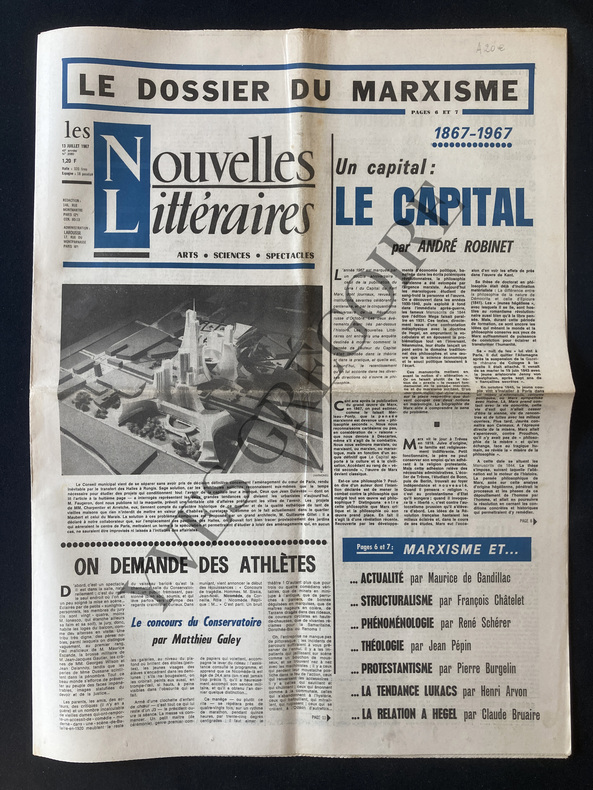
|
|
|
LOUIS ALTHUSSER Lénine et la philosophie suivi de Marx et Lénine devant Hegel
FM/petite collection Maspero 1975. Ouvrage légèrement noirci.
Referencia librero : MM-811

|
|
|
MAGAZINE LITTERAIRE-N°324-SEPTEMBRE 1994-MARX
124 PAGES-21 CM X 27 CM-EN COUVERTURE MARX PAR MORETTI-PREVERT, PAR VALERIE MARIN LA MESLEE, OMONVILLE LA PETITE, PHOTO-THEATRE PAR GILLES COSTAZ, PHOTO ISABELLE CANDELIER ET JEAN-PAUL ROUSSILLON DANS "LINGE SALE"-DOSSIER KARL MARX, 50 PAGES-LES INEDITS DU MAGAZINE LITTERAIRE: NOTE SUR LES THESES SUR FEUERBACH, 6P PAR LOUIS ALTHUSSER-LA CREATION D'UN MONDE, YVES BERGER, PHOTO-JEAN ROLIN: LE PUR ET L'IMPUR-SANTAMARIA, L'ENFER DE JUAN CARLOS ONETTI, DESSIN DE PANCHO-AU SECOURS VOLTAIRE!, 3P PAR MICHEL DELON-L'UNIVERS SECRET DE GRAHAM GREENE, 10P PAR ROBERT Mc CRUM-(17CA)
Referencia librero : ABE-18818670788
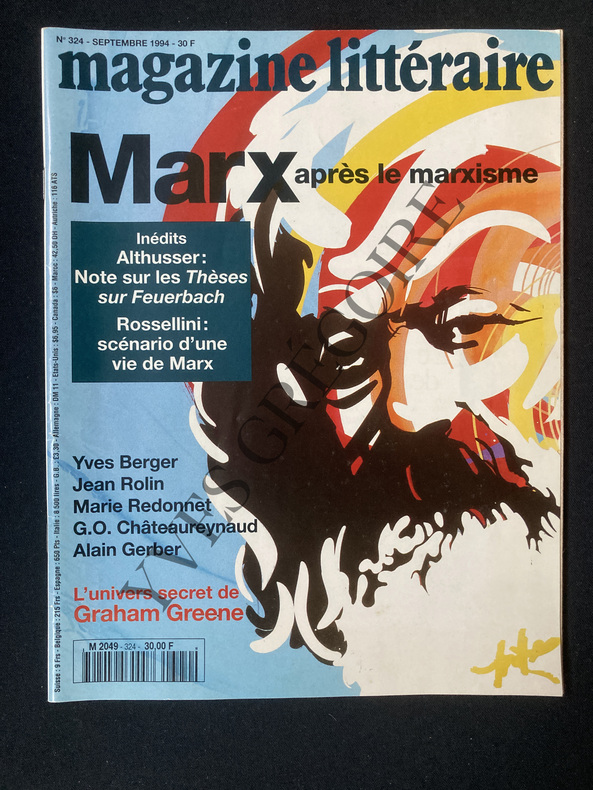
|
|
|
MARX, ENGELS ET LA REVOLUTION DE 1848
Paris François Maspero 1980 in 8 (22x13,5) 1 volume broché, couverture à rabats illustrée, 458 pages [3]. Collection ''. Textes à l'appui '. Bel exemplaire
Referencia librero : 054186
|
|
|
MARX, scienziato e rivoluzionario.
(Milano), Edizioni Lotta Comunista, (1983), in-8, br. edit., pp. 127.
|
|
|
MATCH-N°38-23 MARS 1939
FORMAT 26 CM X 35 CM-56 PAGES-TCHECOSLOVAQUIE: LE REVE DE MASARYK A DURE 20 ANS; RETOUR HISTORIQUE DU TRAITE DE VERSAILLES A L'OCCUPATION ALLEMANDE, 11P-MARGUERITE LEBRUN CHEZ SA COUTURIERE A LA MAISON WORTH, 2P-LES SECRETS DE MONTE CARLO, 11P-LA GUERRE DU "CHIFFRE" PAR PAUL ALLARD, PARTIE 2, 1P-REPORTAGE SUR LES PARACHUTISTES DU CENTRE D'AVIGNON PUJAUT, 7P-DEUX DECHIRURES SANS MANQUE DE 2 CM ET 3 CM EN MARGE INFERIEURE DE UNE-
Referencia librero : ABE-1711378458941

|
|
|
MIDDLE ENGLISH PROSE COMPLAINT OF OUR LADY AND GOSPEL OF NICODEMUS. Ed. from Cambridge, Magdalene College, MS Pepys 2498. Hrsg. v. C. William Marx u. Jeanne F. Drennan.
Hdlbg., Winter, 1987. 232 S. OKt. - Englischer Text. - Gutes Ex.
Referencia librero : 192358DB
|
|
|
Narthex - Heft für radikales Denken. Vol. 4
Halkyonische Assoziation für radikale Philosophie, 2018. Broschiert A4 98
Referencia librero : 010491
|
|
|
Odilon Redon
1925 édition de la nouvelle revue française Paris 1925 - In12 broché 63 pages nombreuses illustrations dans le texte
Referencia librero : 5239
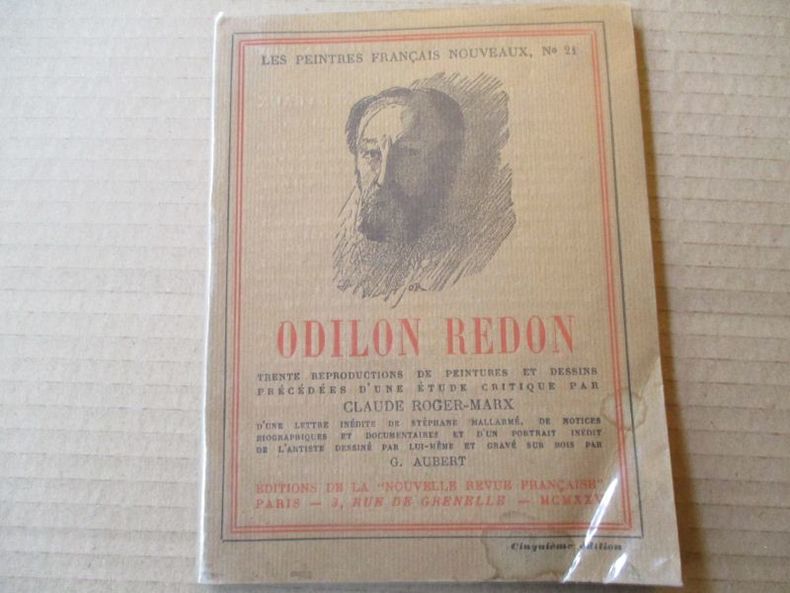
|
|
|
PARIS MATCH-N°1103-27 JUIN 1970
112 PAGES FORMAT 26,5 CM X 34 CM-HUSSEIN DE JORDANIE EN COUVERTURE-LA REVOLTE DES PROFS-HEATH NOUVEAU "PREMIER"-LE TRIOMPHE DE MEXICO,COUPE DU MONDE DE FOOTBALL,6P-UN ADMIRATEUR DE MARQUE POUR LE GOBELINS DE PICASSO: MALRAUX,2P-LA PRINCESSE ANNE,3P-HUSSEIN LES FEDAYIN ET MAO,PAR RAYMOND CARTIER-LE PENTAGONE-ELSA ET ARAGON LA POESIE LES A UNIS POUR TOUJOURS-LE NOUVEAU NUMERO DE RAQUEL LA FEMME AUSSI DESCEND DU SINGE,2P-MANOLETE,3P PAR OLIVIER MERLIN,6 PHOTOS-LA ROLLS DE LA MOTO,HONDA 750,4P-LES MARX BROTHERS,2P PAR ALEXANDRE ASTRUC,PHOTO-EXPOSITIONS,ISCAN ET SES BOITES A MALICE,PHOTO-
Referencia librero : ABE-11625750893

|
|
|
Po mestam shisni i dejatel'nosti Karla Marksa.
Moskau, (Isobrasitel'noe Iskussto, 1970). Marx-Gedenkstätten. 4°. OLwdbd. mit OUmschl. 40 nn. Bll. mit 39 Zeichnungen und Aquarellen von F.Longuet.
Referencia librero : 5222
|
|
|
Politik und sozialistische Gesellschaftskritik. Erich Fromm: Gesamtausgabe; Bd. 5.
DTV, 1981. VII, 480 S.; 8°. Originalleinen mit Schutzumschlag.
Referencia librero : 1053963

|
|
|
QUI? DETECTIVE-N°430-27 SEPTEMBRE 1954
EN COUVERTURE ISABELLE GOLDSMITH ET SA NURSE/"L'ENJEU DE LA HAINE"-PARIS/PETITE FILLE DU MILLIARDAIRE PATINO, ROI DE L'ETAIN, ISABELLE ENJEU DE LA HAINE/2P/PHOTOS-BERGHES/DUNKERQUE/L'ASSASSIN OUBLIE UN MILLION/1P/4 PHOTOS-LONDRES/CALAIS/JE REUSSIRAI OU JE SOMBRERAI! FURENT LES DERNIERES PAROLES DE L'INDOMPTABLE TED MAY-BIEN QUE NEE A SALE LEILA EST TOUT SUCRE/PHOTO-DRAME TENDRE A SAINT ETIENNE/CATHERINE VOULAIT MOURIR.LE "POUSSIN" L'A SAUVE-POLICIERS BELGES ET FRANCAIS METTENT EN ECHEC LE GANG DES MASQUES-MARSEILLE/UN COFFRE FORT ET HUIT MILLIONS DE LA VILLE S'ENVOLENT MAIS LES VOLEURS NE VONT PAS LOIN-CHARTRES/DANS LES GRANDS PRES L'HERBE ETAIT ROUGE-ARGENT SUR SAULDRE/LAMOTTE BEUVRON/SUICIDE, NON! AFFIRMENT LES REPORTEURS DE DETECTIVE/LE MORT FUT SON PROPRE MEURTRIER-SAINT JULIEN DE VALGALGUES (GARD)/CHOUALA LE MONSTRE AVAIT DIT LA VERITE!-EN 4: UN CENTIMETRE CONSACRE LA RESURRECTION DE VICTOR SILLON/1P/5 PHOTOS
Referencia librero : ABE-2668129876
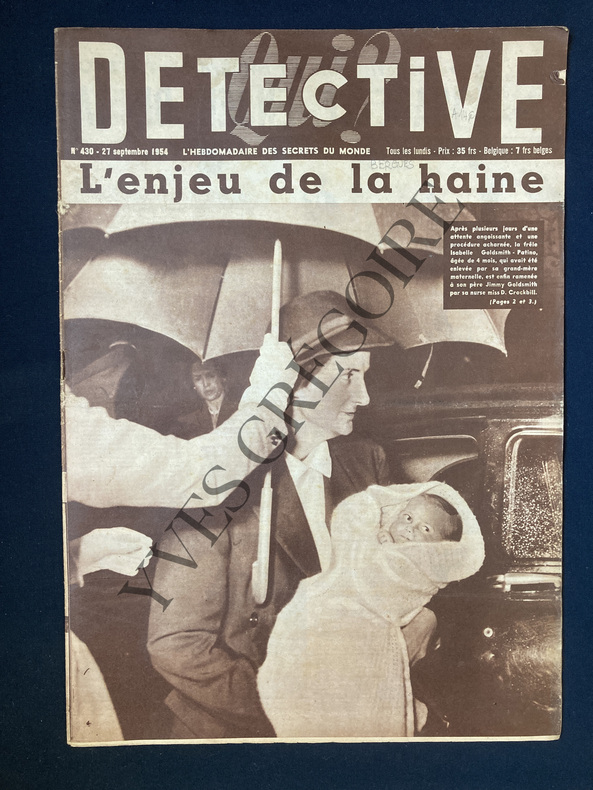
|
|
|
REALITES-N°137-JUIN 1957-NUMERO SPECIAL-LA SECONDE MOITIE DU XXe SIECLE: RENVERSEMENT DU COURANT DES IDEES
116 PAGES-24,2 CM X 31,7 CM-EN COUVERTURE OEUVRE D'ALFRED MANESSIER-RENVERSEMENT DU COURANT DES IDEES, LA FIN DU PESSIMISME, PAR DENIS DE ROUGEMENT, LES DIEUX DETRONES, MARX DEPASSE, FREUD DEPASSE, OU EN SONT NOS MANDARINS, PAR CLAUDE BRULE, LES ANGOISSES, COLIN WILSON OU LE MAL DU SIECLE, NICOLAS DE STAEL OU L'ARTISTE VISITE PAR LA MORT, OPPENHEIMER OU LE CAS DE CONSCIENCE DU SAVANT, L'AVENIR QUI SE PREPARE, LES JEUNES SCIENTIFIQUES VIENNENT EN AIDE AUX MANAGERS, LES ELITES S'ENFLAMMENT POUR LA RECHERCHE SPIRITUELLE, L'OCCIDENT S'EVEILLE AU SENS DE SES RESPONSABILITES PLANETAIRES
Referencia librero : ABE-1551720251131
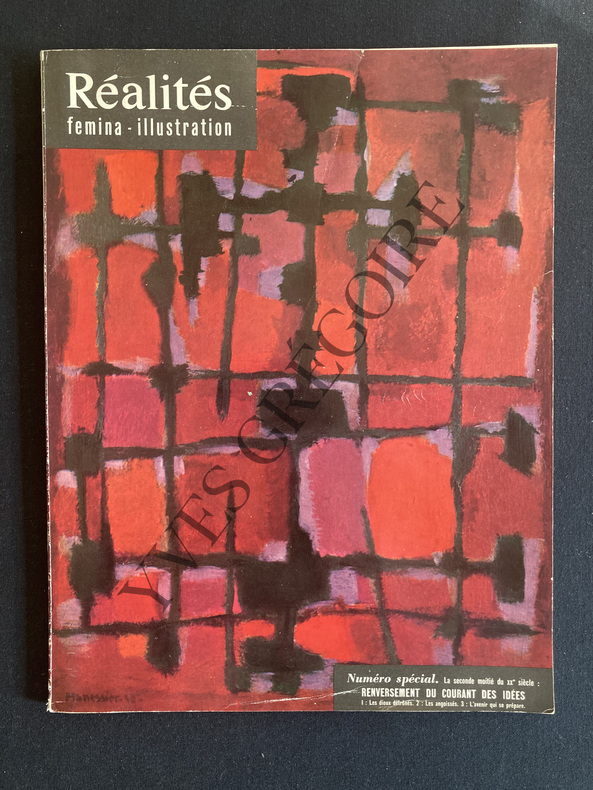
|
|
|
SPECTATEUR-N°102-13 MAI 1947
8 PAGES FORMAT 43X55-EN UNE PHOTO DE PIERRE JOURDAN DANS "LES MARIS DE LEONTINE" 16,5X20-DES MOTS! DES MOTS! DES MOTS!,PAR ANDRE ROUBAUD-HOMMAGE A PAUL DUKAS,CINQUANTENAIRE DE L'APPRENTI SORCIER,PAR ADOLPHE BOSCHOT,SUITE P6-BALANCHINE A L'OPERA-LE CONSERVATOIRE D'ART DRAMATIQUE VA AVOIR UN AN D'EXISTENCE,PAR YVON NOVY-SUZANNE VALADON,PAR CLAUDE ROGER MARX,1 PHOTO-"UNE NUIT A CASABLANCA" PAR LES MARX BROTHERS,CRITIQUE PAR BERNARD GAVOTY
Referencia librero : ABE-10017830393

|
|
|
The Marx Brothers Poster Book.
Zachary Kwinter, London, 1991. Fol. , 37 x 27,5 cm, kartoniert / Paperback
Referencia librero : 34783

|
|
|
Thesen des Zentralkomitees
Bln., Dietz, 1983. der SED zum Karl-Marx-Jahr 1983. (2. Aufl.). OBrosch. 47 SS.
Referencia librero : 5171
|
|
|
TRESORS DE LA BIBLIOPHILIE, LES. AVANT-PROPOS DE ROGER MARX. - COMMENT J'AI FAIT MES LIVRES - PAR HENRI MATISSE. GENEVE. EDITO-SERVICE. SANS DATE.
PETIT IN-8 (21,5 X 14 CENTIMETRES ENVIRON) DE XXV PAGES + 91 PLANCHES HORS TEXTE, RELIURE DE L'EDITEUR A LA BRADEL SKIVERTEX A L'IMITATION DU VEAU MARBRE, DOS ET PLATS ENCADRES D'UN DOUBLE FILET DORE, TITRE DORE.
Referencia librero : 353
|
|
|
Ärzte um Karl Marx. Hrsg. v. H. Dressler.
Berlin, 1970. 148 S. OBr. Umschlag lichtrandig.
Referencia librero : 604807
|
|
|
"[MARX, KARL], KARLA MARKSA
Kapital. Kritika Politicke Ekonomije. - [FIRST SERBIAN TRANSLATION OF MARX'S ""DAS KAPITAL""]
Beograd, Izdavacka Knjizarnica Gece Kona, 1924. 8vo. In the original printed wrappers. Spine renewed, preserving most of the original spine. Ink stain to front wrapper. Previous ower's name to top of title-page. First leaves with a few underlignings, otherwise internally fine and clean. 198, (4) pp.
Referencia librero : 56992
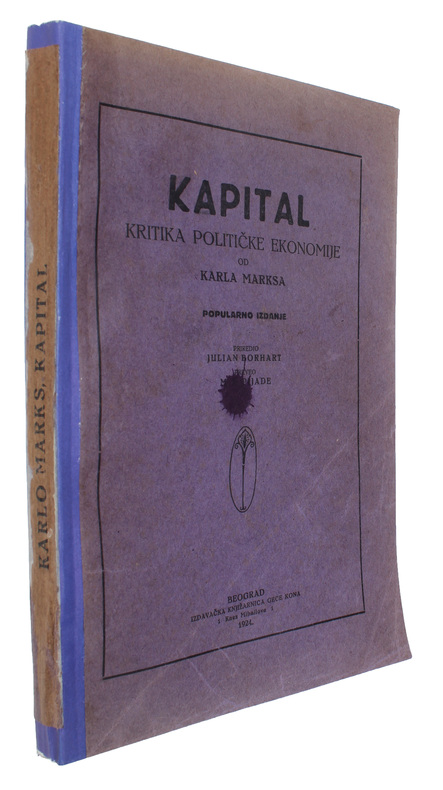
|
|
|
"[MARX, KARL].
The Civil War in France. Address of the General Council of the International Working-Men's Association. - [MARX' SEMINAL DEFENSE OF THE PARIS COMMUNE]
High Holborn, for the Council by Edward Truelove, 1871. Small 8vo. Near contemporary quarter cloth with silver lettering to front board. Binding with signs of use, but overall good. One closed marginal tear and title-page with a few brownspots, otherwise very nice and clean. 35 pp.
Referencia librero : 58474
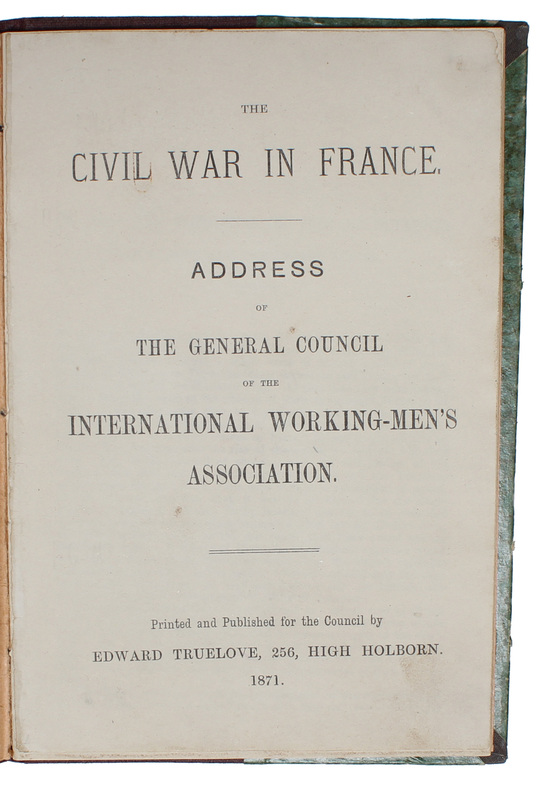
|
|
|
"Adrien Marx Gustave Doré"
"Histoires d'une Minute -Physionomies Parisiennes"
"1864. Paris E. Dentu Editeur 1864 e.o. (pas de gd papier) - Relié demi-bradel 12 cm x 18 cm 274 pages - Texte de Adrien Marx préface de Charles Monselet ills de Gustave Doré ex-libris de F.-M. Caye - Rousseurs sinon bon état; premier livre de l'auteur"
Referencia librero : 19697
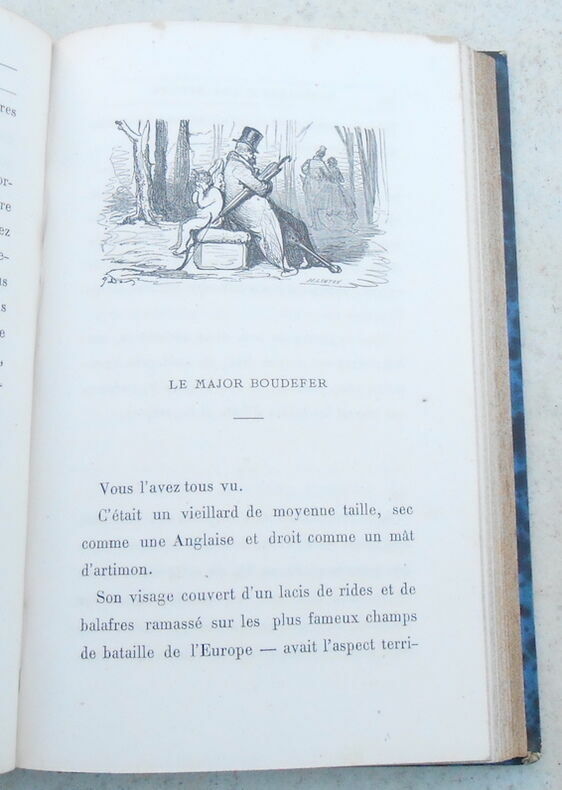
|
|
|
"ENGELS, FRIEDRICH & KARL MARX.
Die heilige Familie oder Kritik der kritischen Kritik. Gegen Bruno Bauer & Consorten. - [THE COLLABORATION THAT WOULD CHANGE THE WORLD]
Frankfurt a. M., 1845. 8vo. Contemporary black half calf. Professionally rebacked. Title-page somewhat dusty and re-hinged. VIII, 335, (1) pp.
Referencia librero : 58581
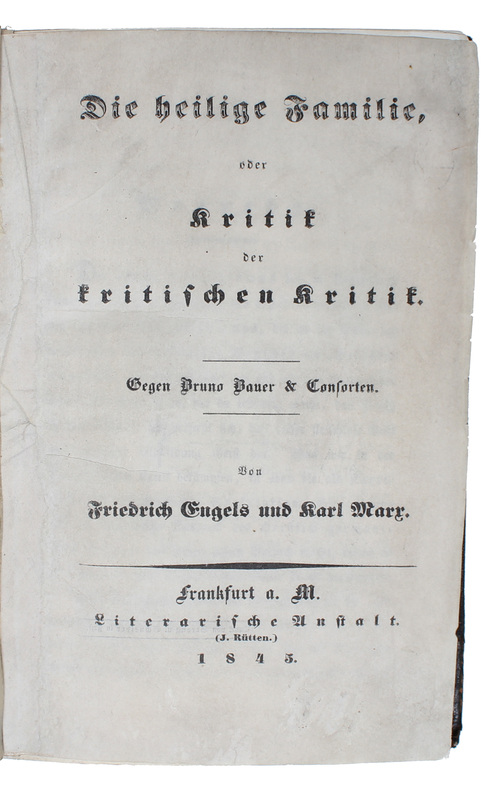
|
|
|
"Engels Friedrich;Marx Karl""
Manifiesto comunista
1959. Paperback. Very Good-New. Rare book paperback
Referencia librero : T60824 ISBN : 8446022893 9788446022893

|
|
|
"etc André Morizet Rosa Luxembourg Emile Vandervelde Edouard Berth Emile Pouget Charles Guiesse Karl Marx F. de Pressencé Jean Longuet Louis Héliès Béatrice et Sidney Webb Paul Lafargue Emile Buré Hubert Lagardelle P. Renaudel V. Griffuelhes Franz Mehring Edouard Dolléans Ernest Laffont Paul Louis Max Beer Popovitch Jules Uhry Raoul Briquet"
"Le Mouvement Socialiste 1903"
"1903. Paris Editions du Mouvement Socialiste 1903 du 1er Janvier 1903 n°111 au 15 décembre 1903 n°131 (il nous manque le n°128 et un numéro est double) soient 18 numéros - Broché 13 cm x 19 5 cm pagination continue de la page 1 à la page 704 (n°118) puis de la page 1 à la page 640 (n°126) puis de la page 1 à la page 640 (n°131) ; il nous manque de la page 81 à la page 160 inclus dans la troisième série - Fondateur : Hubert Lagardelle textes de Edouard Berth Rosa Luxembourg Emile Pouget Charles Guiesse Karl Marx F. de Pressencé Emile Vandervelde Jean Longuet Louis Héliès Béatrice et Sidney Webb Paul Lafargue Emile Buré Hubert Lagardelle P. Renaudel V. Griffuelhes Franz Mehring Edouard Dolléans André Morizet Ernest Laffont Paul Louis Max Beer Popovitch Jules Uhry Raoul Briquet etc ; tables des matières notices bibliographiques - Etat correct"
Referencia librero : 10340
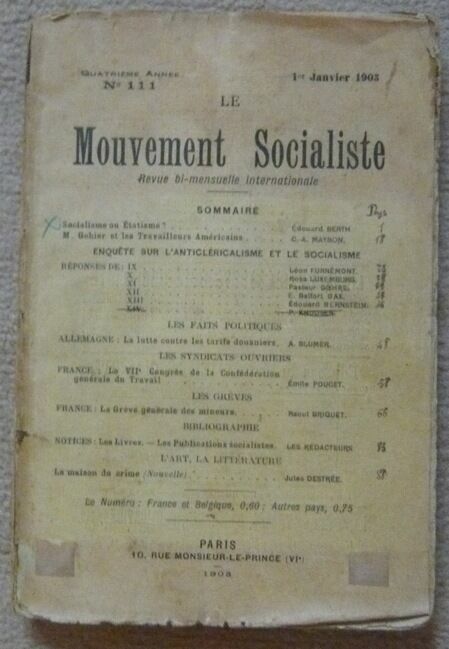
|
|
|
"Félicien Champsaur A. Wolff A. Daudet H. Gréville E. Zola G. Geffroy G. de Maupassant A. Proust Ed. de Goncourt P. Bonnetain J. Richepin H. Céard O. Mirbeau R. Marx P. Bourget S. Mallarmé R. de Bonnières J.H. Rosny J. Ajalbert L. de Fourcaud J.K . Huysmans L. Mullen Raffaëlli"
"Les Types de Paris"
"1899. Paris Édition du Figaro Plon et Nourrit imprimeurs-éditeurs s.d. (1899) - Relié couv. des 10 fascicules conservés 24 cm x 28 5 cm VII+ 159 pages - Textes de A. Wolff A. Daudet H. Gréville E. Zola G. Geffroy G. de Maupassant A. Proust Ed. de Goncourt P. Bonnetain J. Richepin H. Céard O. Mirbeau R. Marx P. Bourget S. Mallarmé R. de Bonnières J.H. Rosny J. Ajalbert L. de Fourcaud Félicien Champsaur J.K . Huysmans L. Mullen ills de Raffaëlli - 2 couv. se détachent rousseurs cartonnage usagé sinon bon état ; textes en « pré-originale»"
Referencia librero : 15492
|
|
|
"Hem Day (Marcel Dieu)"
"L'Internationale de 1864"
"1965. Paris-Bruxelles Cahiers Pensée et Action n°28-29 1965 - Broché 14 cm x 22 cm 158 pages - Texte de Hem Day (Marcel Dieu) - Un léger manque sur la couv. sinon bon état"
Referencia librero : 13343
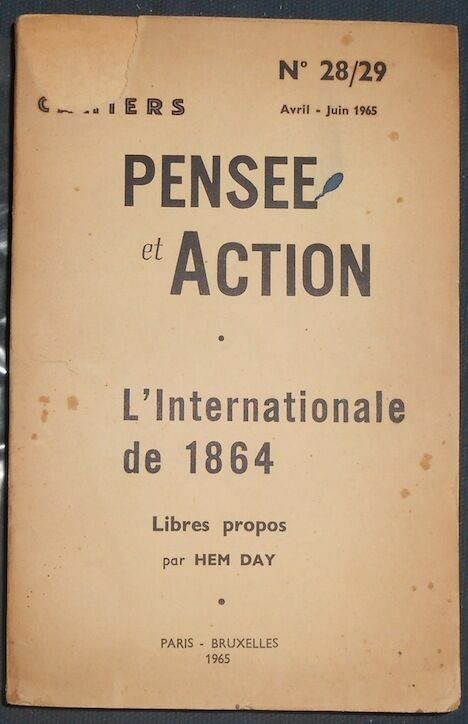
|
|
|
"Karl Marx"
"OEuvres Philosophiques"
"Paris. 17 5 cm x 28 cm. 1981. Cartonné et toilé. 1234 pages. Paris Éditions Champ Libre 1981. 2 volumes cartonnés et toilés 17 5 cm x 28 cm 1234 pages. Textes de Karl Marx traduction de J. Molitor revue et augmentée par Jean-Jacques Raspaud. Très bon état" "Très bon état"
Referencia librero : 100074264
|
|
|
"Kostas Axelos"
"Horizons du Monde"
"1974. Paris Éditions de Minuit 1974 e.o. - Broché 13 5 cm x 22 cm 136 pages - Texte de Kostas Axelos - Bon état"
Referencia librero : 19117

|
|
|
"MARX, KARL.
Capital. I. - The Serfdom of Work. II. - The Lordship of Wealth. [In ""To-Day: A Monthly Gathering of Bold Thoughts. Vol. I. May - September, 1883]. - [THE FIRST BRITISH TRANSLATION OF ANY PART OF ""DAS KAPITAL""]
London, The Modern Press, 1883. Royal8vo. Entire volume present, in the original olive green full cloth binding with gilt lettering to spine. Front board with black line-borders, black vignette, gilt lettering and gilt ornamentation depicting the sun. Spine with small mark and professional repairs to head and tail of spine. Light occassional brownspots to first leaves, otherwise a fine and clean copy. (Capital:) Pp. 57-68" 145-150. (Entire volume:) IV, 600 pp. Housed in a cloth clamshell box with gilt lettering to spine.
Referencia librero : 60072
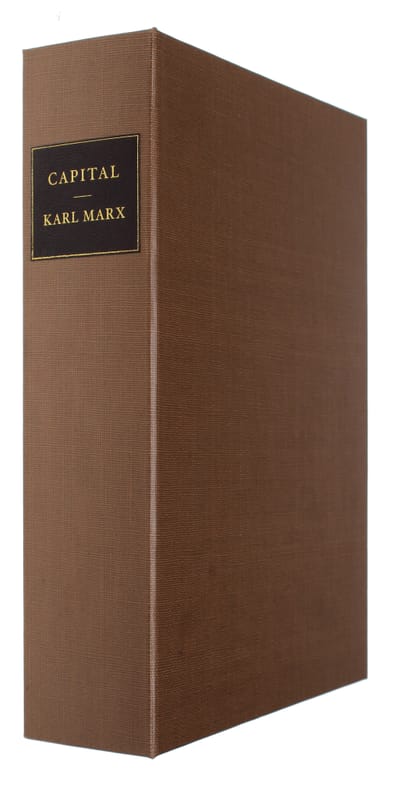
|
|
|
"MARX, KARL.
Das Kapital. Kritik der politischen Oekonomie. Erster Band. Buch I: Der Produktionsprocess des Kapitals. - [THE NEW RELIGION - PMM 359]
Hamburg, Otto Meisner, 1867. 8vo. Nice contemporary black half calf with gilt spine. Minor wear to hinges and capitals, which have tiny, barely noticeable professional restorations. Inner hinges re-enforced. Contemporary owner's names (Emil Kirchner and Karl Kirchner (1887)) to front free end-paper. Contemporary book-plate to inside of front board (Ernst Ferdinand Kirchner). A very nice copy with just the slightest of occasional brownspotting. Housed in a very nice custom-made black full morocco box with gilt llettering to spine. XII, 784 pp.
Referencia librero : 56311
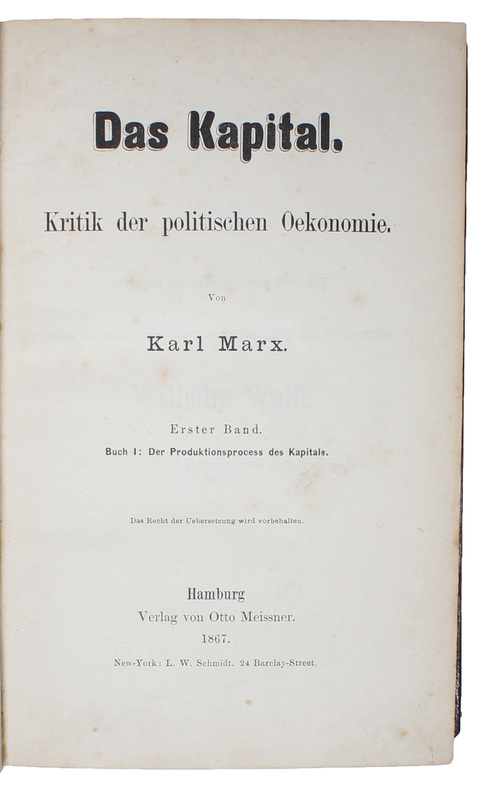
|
|
|
"MARX, KARL (FRIEDRICH ENGELS edt.).
Das Kapital. Kritik der politischen Oekonomie. Zweiter Band. Buch II: Der Cirkulationsprocess des Kapitals. Herausgeben von Friedrich Engels. - [""THE FORGOTTEN BOOK OF CAPITAL""]
Hamburg: Otto Meissner, 1885. 8vo. Very nice contemporary black half calf with gilt spine. A bit of wear to extremitoes. Inner front hinge a little weak. Title-page a littel dusty, but otherwise very nice and clean. Book-plate (Arnold Heertje) to inside of front board. XXVII, (1), 526 pp. + 1 f. With pp. 515-16 in the first state (""Consumtionsfonds"" with a C) and with the imprint-leaf at the end.
Referencia librero : 57044

|
|
|
"MARX, KARL.
Der 18the Brumaire des Louis Napoleon [in: Die Revolution, eine Zeitschrift in zwanglosen Heften. Herausgegeben von J. Weydemeyer. Erstes Heft]. - [THE MOST IMPORTANT PROPOSITIONS IN THE MARXIST TEACHING ON THE STATE]
New-York, 1852. Bound in a later (ab. 1900) red full cloth binding with silver lettering to front board. A bit of wear to capitals, corners, and extremities. Front free end-paper with small repairs and strengthening. A couple of closed tears to blank outer margin of title-page (no loss and not affecting printing)Inner blank margins of the first few leaves strengthened (far from affecting text). Occasionally a few marginal notes. and underlinings. A near contemporary notice in Russian about the work has been inserted between the title-page and the preface. All in all a good copy with no major flaws. IV, (4), 62 pp.
Referencia librero : 58600
|
|
|
"MARX, CARLOS (+) FREDERICO ENGELS (+) JULIO GUESDE.
El Capital. Resumido y acompanado de un estudio sobre el socialismo científico por Gabriel Deville. Primera edición [Marx / Deville] (+) Socialismo Utopico y Socialismo Cientifico [Engels] (+) La Ley de Los Salarios y Sus Consecuencias [Guesde]. - [FIRST SPANISH EDITION OF THE MOST IMPORTANT ABRIDGED VERSION OF ""THE CAPITAL""]
Madrid, Ricardo Fé, 1887. 8vo. Contemporary brown half calf with gilt lettering and ornamentation to spine and red paper covered boards. Most leaves evenly browned (due to the quality of the paper) and some brownspotting to last few leaves. Overall a very good copy indeed of this otherwise fragile book. [Socialismo Utopico... :] pp. (1)-91, (1) + frontispiece of Engels" [La Ley de Los Salarios... :] pp. (1)-44 + frontiespiece of Guesde" [El Capital:] pp. (I)-LVI, 263 pp.
Referencia librero : 58427
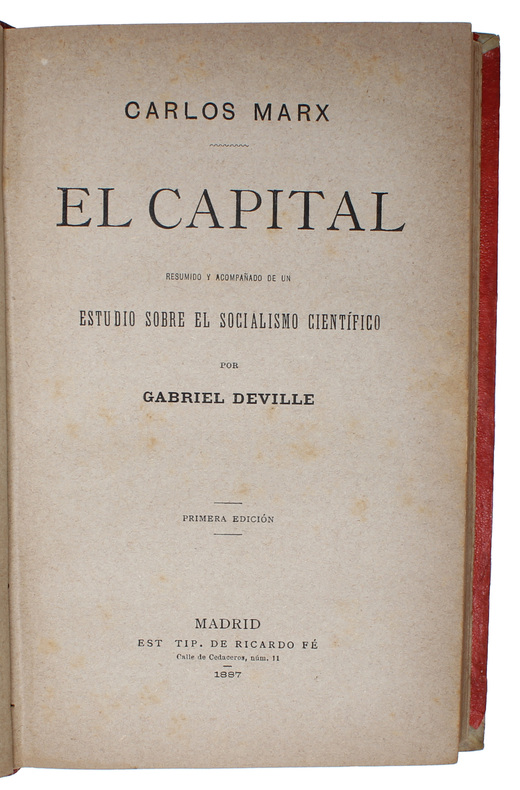
|
|
|
"MARX, KARL.
Haq-qâpîtâl: bîqqôret hak-kalkala ham-medînît, [ha-Kapital: bikoret ha-kalkalah ha-medinit], [hakapital], [i.e. Hebrew ""Das Kapital""]. 2 vols. - [FIRST HEBREW TRANSLATION OF 'DAS KAPITAL']
Yerûsalayim [Jerusalem], Sifriyyat Pôalîm, 1947 & 1954. Large8vo. Two volumes both in publisher's original printed cloth with the original dust-jackets. 763 pp."" 516 pp.Vol. 1: A bit of misolocured to spine and front board. Front dust-jacket detached from the spine and back-part. Spine lacking a third of the paper. Very fragile.Vol. 2: Upper and lower part of spine miscoloured. Dust-jacket missing upper and lower part of spine. Both volumes internally very fine and clean.
Referencia librero : 56712
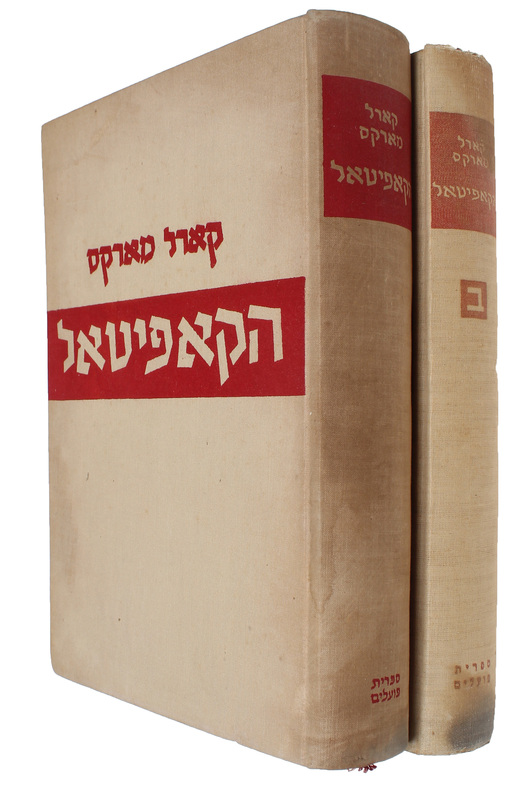
|
|
|
"MARX, KARL.
Herr Vogt. - [MARX' STRUGGLE AGAINST DEFAMATION ]
London, 1860. 8vo. Bound partly uncut with the original wrappers in a nice recent half calf pastiche binding with four rasied bands and gilt lettering to spine. Front wrapper with marginal repairs and back wrappers with repairs with minor loss of text. Light brownspotting to first and last leaves. A fine copy. VI, (2), (1)-191, (1, -errata) pp.
Referencia librero : 56420
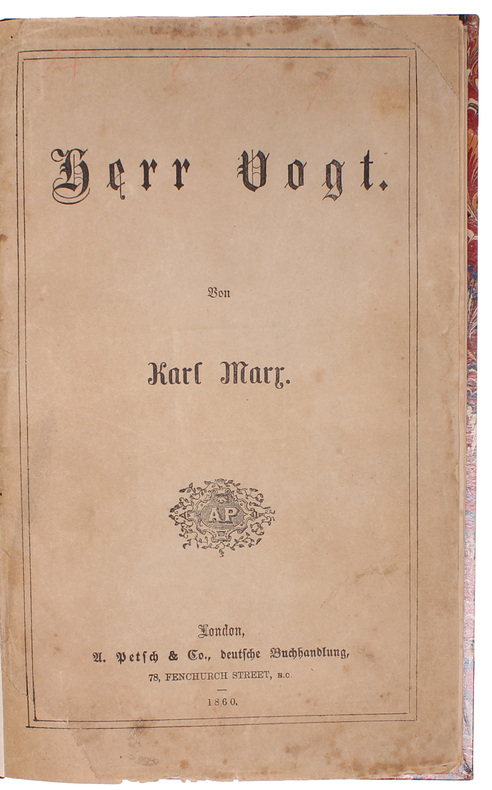
|
|
|
"MARX, CARLO. [KARL].
Il Capitale. Critica dell'economia politica. - [FIRST ITALIAN TRANSLATION OF MARX' ""DAS KAPITAL""]
Torino, Unione Tipografico-Editrice, 1886. Royal8vo. Bound in a contemporary half vellum binding with red and green title label to spine with gilt lettering and ornamentation to spine, forming six compartments. In ""Biblioteca dell'Economista"", Third Series, volume 9. wear to extremities and light brownspotting throughout, especially to first and least leaves. e copy. Il Capitale: 685 pp. [Entire volume: (4), 903, (1) pp.].
Referencia librero : 55015
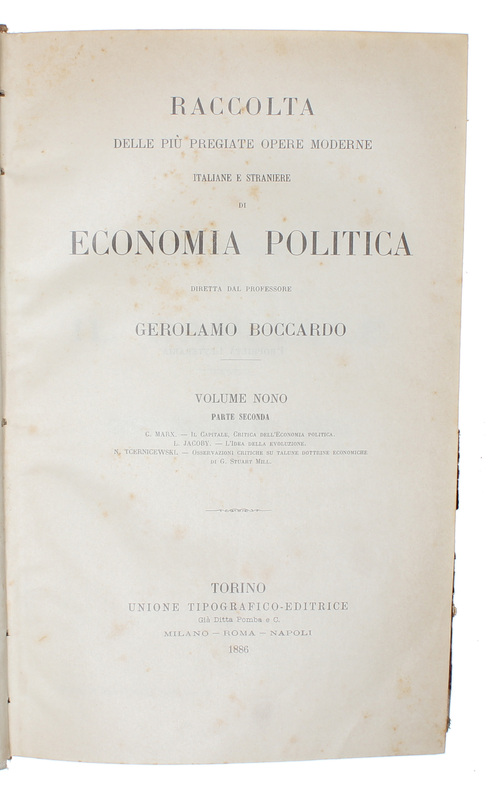
|
|
|
"MARX, CARLO. [KARL].
Il Capitale. Critica dell'economia politica. - [FIRST COMPLETE ITALIAN TRANSLATION OF MARX' ""DAS KAPITAL""]
Torino, Unione Tipografico-Editrice, 1886. Royal8vo. Bound uncut and largely unopened with the original printed wrappers in a very nice recent red half calf binding with marbled paper covered boards. Half-title and title-page browned. Published as ""Biblioteca dell'Economista"", Third Series, volume 9. An unusually fine copy. Il Capitale: 685 pp. [Entire volume: (4), 903, (1) pp.].
Referencia librero : 55866
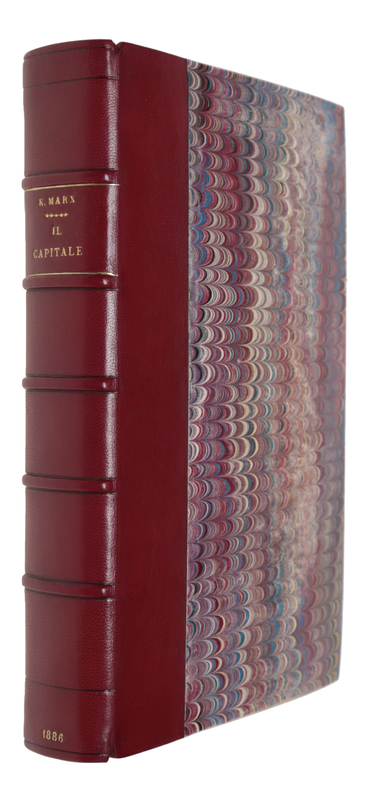
|
|
|
"MARX, KARL.
Kapital: k'aghak'atntesut'yan k'nnadatut'yun [Armenian i.e. ""Das Kapital""]. 4. vols. - [FIRST ARMENIAN TRANSLATION OF 'DAS KAPITAL']
Erevan, Kusakts'akan Hratarakch'ut'yun, 1933 - 1949. Royal8vo. 4 volumes, all in the original red (in four different nuances) full cloth with embossed title to front boards and spine. Light soiling to extremities on all four volumes expecially volume 1 with heavy soiling. Hindges a bit weak. All volumes internally fine and clean. XL,745, (3) pp." XXVII, 492, (4) pp. XXVI, 452 pp." (4), 452 pp.
Referencia librero : 54792

|
|
|
"MARX, KARL.
Kapitalen. 2 Dele. Første Bind. Kapitalens Produktionsproces. Oversat efter Originalens tredje Oplag. 2. Kapitalens Cirkulationsproces.Udgivet efter Forfatterens Død af Friedrich Engels. [i.e. Danish ""Das Kapital""]. - [FIRST DANISH TRANSLATION OF ""THE CAPITAL""]
København, (Copenhagen), 1885-87. 4to. In contemporary half cloth with gilt lettering to spine. Even browning as usual, due to the paper quality. An envelope pasted on to front free end-paper containing Danish articles on Marx. Previous owner's name to title-pages. A fine and clean copy with both half-titles present (""Socialistisk Bibliotek"" Vol. IV-V). Vol 1: (2), 473, (1)" Vol 2: VII-1" (4), 363, (1) pp.
Referencia librero : 55207
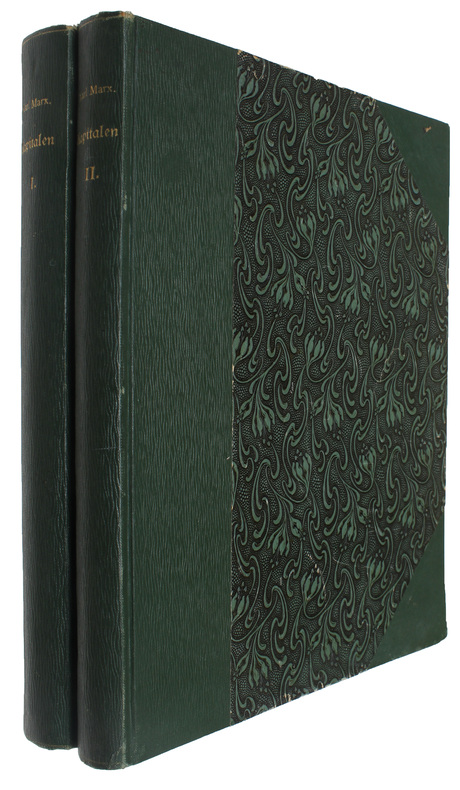
|
|
|
"MARX, KARL.
Kapitalut. Kritika na politicheskata ekonomiia. [i.e. Bulgarian ""Das Kapital""]. [Translated by Georgi Bakalov]. - [FIRST FULL BULGARIAN TRANSLATION OF MARX'S 'DAS KAPITAL']
Stara Sagora, 1910. 8vo. Contemporary half cloth with gilt lettering to spine. Spine with wear. Upper inner corner of title-page with repair, missing the 'K' in 'Karl'. Two last leaves with marginal repairs, not affecting text. Light occassional brownspots throughtout. XXX, (2), 598, (2) pp. + frontiespiece of Marx.
Referencia librero : 56711
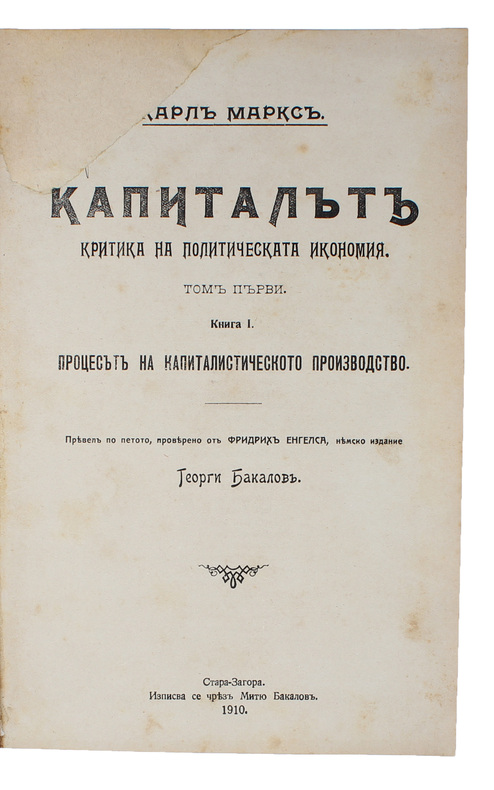
|
|
|
"MARX, KARL (+) GABRIEL DEVILLE (+) [TRANSLATOR:] CHRISTIAN RAKOVSKY (+) ED. BERNSTEIN (+) GEORGI PLEKHANOV
Kapitalutu. [i.e. Bulgarian ""Das Kapital""] [Bound with]: Predpostavkit na sotsializma i zadachitu na sotsialnata demokratsiya [i.e. Bulgarian: ""The Preconditions of Socialism and the Tasks of Social Democracy""] (+) Marksovata Istoricheska Teoria [i.e... - [FIRST BULGARIAN EDITION OF THE MOST IMPORTANT ABRIDGED VERSION OF ""THE CAPITAL""]
Varna, 1900. 8vo. In contemporary half calf with four raised bands to spine. Extremities with wear. Frontboard missing parts of cloth. Two bands on spine missing some of the leather. Verso of front free end paper with notes in contemporary hand and previous owner's name to title-page of all three works. A few occassional marginal lignings in pencil, otherwise internally good and clean. [Predpostavkit na sotsializma i zadachitu...:] XII, 257, (1), XIV pp. [Marksovata Istoricheska Teoria:] 86, (2) pp. [Kapitalutu:] IV, (5)-284 pp.
Referencia librero : 57116
|
|
|
"MARX, KARL.
Kapitalut. Kritika na politicheskata ekonomiia. [i.e. Bulgarian ""Das Kapital""]. [Translated by Dimitar Blagoev] (+) Kapitalut. [Translated by Georgi Bakalov] (+) Karlu Marksu i Negovoto Vreme [i.e. Bulgarian: ""Karl Marx and his Time""]. - [THE FIRST BULGARIAN TRANSLATIONS OF MARX'S 'DAS KAPITAL']
[Blagoev-translation:] Sofia, [presumably 1910 but august 1909 stated on last leaf of preface] & [Ba [Blagoev-translation:] 8vo. In a contemporary full cloth binding with red leather title-label with gilt lettering to spine. Spine with wear and light soiling to extremities. Hindges a bit weak First 10 leaves with stain in margin, otherwise a good copy. (6), XXXI, (1), 675, (1) pp.{Bakalov-translation:] 8vo. In contemporary half calf with five raised bands and gilt lettering to spine. Wear to extremities and hindges a bit weak Repair to inner margin of title-page. Internally fine and clean. XXX, (2), 598, (2) pp. + frontiespiece of Marx. Withbound is ""Karl Marx and His Time"": (1)-180 pp.
Referencia librero : 57297
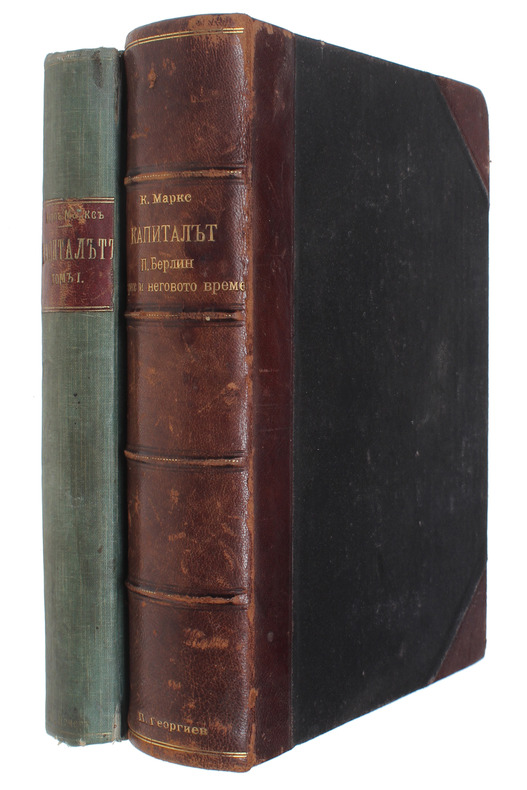
|
|
|
"MARX, KAREL [KARL].
Kapitál. Kritika Politické Ekonomie. [i.e. Czech ""Das Kapital""]. [Translated by Theodor Smeral]. - [FIRST CZECH TRANSLATION OF DAS KAPITAL]
Praze, 1913. Royal8vo. In contemporary full cloth with gilt lettering to spine. Ex-libris pasted on to front free end-paper. A few occassional underlignings in text. XXIII, (1), 619, (5) pp.
Referencia librero : 57764
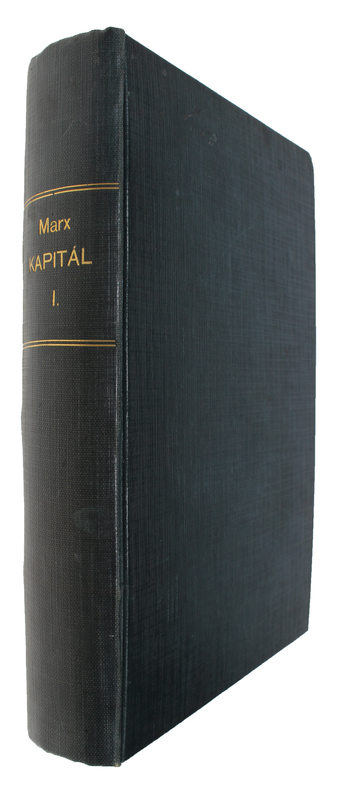
|
|
|
"MARX, KARL.
Kapital. Krytyka ekonomji politycznej. Tom I. Ksiega pierwsza. Przebieg wytwarzani kapitalu.
Warszawa [Warsaw], Nakladem Spóldzielni Ksiegarskiej ""Ksiazka"", [1933] (1926 printed on title-page) Large8vo. In contemporary full blind-stamped cloth. Wear to extremities. Hindges a bit weak. (4), XXXVII, (1), 5-905, (5) pp.
Referencia librero : 57816
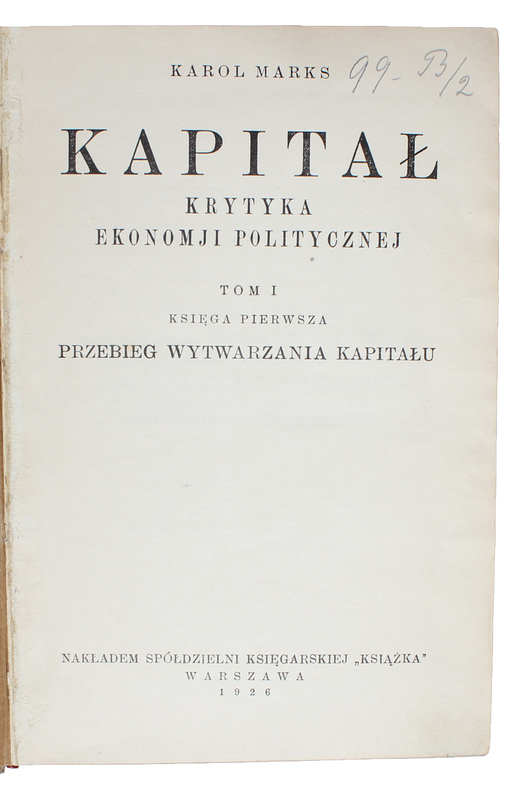
|
|
|
"MARX, KARL.
Kapitalut. Kritika na politicheskata ikonomiya. [i.e. Bulgarian ""Das Kapital""]. [Translated and introduction by Dimitar Blagoev] (+) Rech za svobodata na turgoviyata [i.e. Bulgarian: ""A speech on free trade""]. - [FIRST PARTIAL BULGARIAN TRANSLATION OF MARX'S 'DAS KAPITAL']
[Kapitalut:] Balchik, Izdanie na Krist'o Ivanov, 1905. [Speech On the Question of Free Trade:] Sofia 8vo. In contemporary red half calf. Extremities with wear. Previous owner's name in contemporary hand to upper part of both title-pages. Light browning throughout and a few occassional underlignings in text, mainly in ""A speech on free trade"". [Kapitalut:] XXXVIII, 122 pp. [Rech za...:] 27, (1).
Referencia librero : 58543
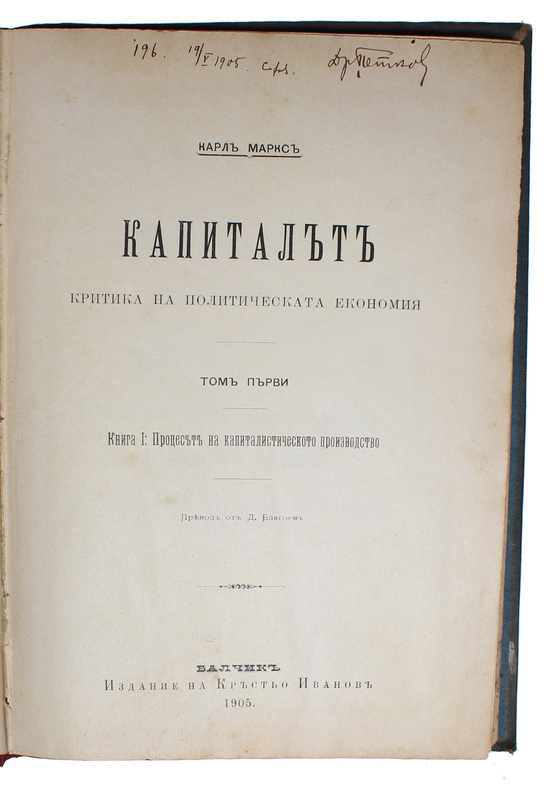
|
|